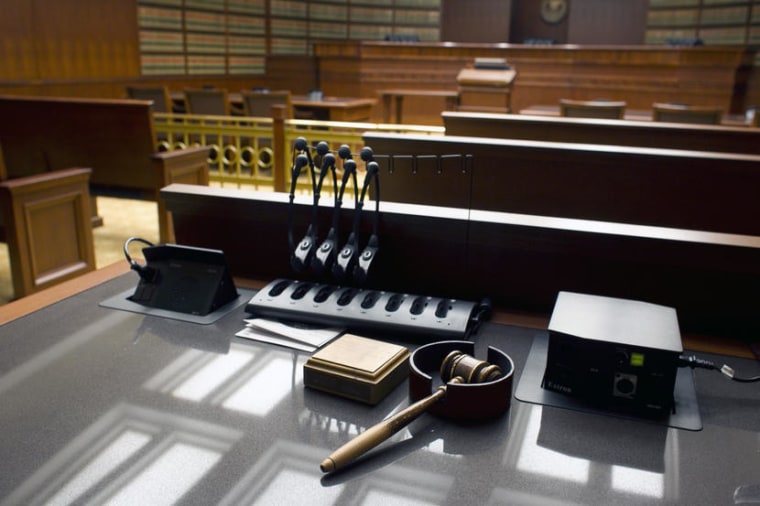In March, Pennsylvania Gov. Tom Wolf (D) did what many governors did: he responded to the coronavirus pandemic by issuing a stay-at-home order that shuttered much of the state, including temporarily closing many businesses.
Several state Republican lawmakers and four western Pennsylvania counties filed suit, and yesterday, their litigation won.
A federal judge in western Pennsylvania has ruled that the coronavirus-related shutdown imposed by Gov. Tom Wolf is unconstitutional for reasons including violating the First Amendment Right to assemble. U.S. District Court Judge William Stickman IV said the limits on gatherings of 25 people indoors and 250 out of doors, as well as the stay-at-home and business closure components of the orders issued by Wolf and Health Secretary Dr. Rachel Levine were both unconstitutional.
Judge William Stickman IV, a 41-year-old judge put on the federal bench by Donald Trump and Senate Republicans, concluded that the governor's actions were "undertaken with the good intention of addressing a public health emergency. But even in an emergency, the authority of government is not unfettered."
As a practical matter, the significance of the ruling is limited, because it applies to restrictions that are no longer in place. Nevertheless, Pennsylvania's Democratic administration announced plans to appeal the ruling.
What struck me as notable about Stickman's ruling, however, was a reference to what the jurist referred to as "the Lochner era." He added, "[O]ur Supreme Court has never repudiated the recognition that a citizen has the right to work for a living and pursue his or her chosen occupation."
And what, exactly, is "the Lochner era"? I'm glad you asked.
Circling back to our coverage from several years ago, at issue is an old Supreme Court case called Lochner v. New York, decided in a 5-4 ruling in 1905, which has been a popular topic of conversation in fringe, far-right circles for a long while.
The case dealt with a New York law, approved in 1895, that sought to protect bakery workers by establishing a maximum number of hours (10) they could work on a given day. The court's majority ruled that the law was unconstitutional: the relationship between businesses and workers, the court said, was effectively outside the reach of government regulators.
The "Lochner era," spanning roughly the first third of the 20th century, was born. In the process, the Supreme Court struck down practically every public policy -- including minimum-wage laws -- intended to protect workers from private-sector excesses. There was a "liberty of contract," the justices said, and labor laws were an unconstitutional interference.
In other words, when Americans agree to accept a job, they necessarily accept everything that comes with that employment: the agreed upon wages, the hours, the working conditions, etc. If Americans disapprove, they can quit and look for some other job. Under this school of thought, the government lacked the legal power to intervene on workers' behalf.
Fortunately, the court's radicalism didn't last. FDR began filling the court with more progressive justices in the 1930s; the "New Deal" eventually survived court challenges; and the Lochner era became known as an unfortunate fluke of history.
At least, it did. Back in 2005, the New York Times Magazine published a striking piece on the so-called "Constitution in Exile movement," which believes, among other things, that the Lochner ruling was right and that that era never should have ended.
Justice Clarence Thomas' opinions, for example, have placed him squarely in the middle of this "movement." Sen. Rand Paul (R-Ky.) has also made clear that he longs for the Lochner era, calling the ruling a "wonderful decision." In 2015, George Will wrote a syndicated column endorsing a Lochner "litmus test" for presidential candidates.
And now, a Trump-appointed judge in Pennsylvania is referencing the Lochner era while striking down a governor's pandemic restrictions.
To an extraordinary extent, the modern American mainstream simply wouldn't recognize a society shaped along Lochner lines. A return to this era would mean an end to minimum-wage laws, an end to laws prohibiting discrimination in the workplace, and the elimination of practically all legally mandated workplace benefits, even related to hazardous working conditions.
Voters haven't had much reason to worry about this, because Lochner-era proponents have largely been relegated to the fringes. But yesterday's ruling from a Trump-appointed judge serves as a reminder: in contemporary politics, radical ideas can move from the Republican fringe to the Republican mainstream with unsettling speed.

